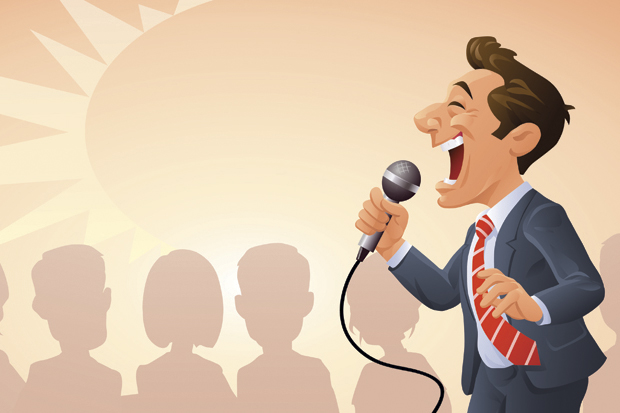Have you ever wanted to know how dictators stay in power? Try visiting a comedy club. I went to one the other night. The acts varied in quality. No one died on their backside, no one stormed it, the audience went away happy. But at a couple of points the thing happened, the thing that gives you a clue about dictators: the comedian picked on a member of the audience. In fairness they were both minor examples. One was the compère assessing how a line had gone down. Two guys in their fifties sitting at the side had laughed. ‘Wow, even you two liked that,’ said the compère. ‘Look at you, Waldorf and Statler there.’ Everyone laughed, including Waldorf and Statler, and the evening moved on. Later, a comedian commented on how people were dressed, including one guy in the front row whose checked shirt gave him ‘the Brokeback Mountain look’. Again, it got a laugh, no more was made of it.
But you should have seen the people nearby. Their body language said everything: tense shoulders, sideways glances at Checked Shirt lest a full turning of the head draw the comedian’s attention to them instead, laughs more nervous than everyone else’s. Because that’s what happens when someone gets picked on: the rest of the audience breathe a sigh of relief that it’s not them, and settle down to enjoy the spectacle. Only when those sitting near the victim become sure they’re not going to get picked on too can they settle down as well. But boy, when they do… The audience becomes a single mass. The victim has to sit there and join in, of course. But don’t let’s kid ourselves what’s going on here: it’s bullying.
Seeing an audience behave like this you’re struck by just how powerful the herd instinct is. It doesn’t seem to matter which herd you belong to — it’s just enough that it is a herd, and someone is outside it. Their status as a non-member makes your membership all the more life-affirming. It’s this instinct that dictators mine to such great effect.
I should point out that I’m not talking about every act of comedian-on-punter aggression. Sometimes it’s started by the punter himself, with a heckle, and after that he deserves everything he gets. Stephen K. Amos greets unsuccessful heckles with: ‘You hear that silence? That was yours. You hear that laugh? That was mine.’ Some heckles do hit the spot, a sign of the two-way tension inherent in any worthwhile evening of comedy. During his short and ill-advised stand-up career, Michael Douglas’s half-brother Eric once appeared at a London club. Annoyed by the audience’s lack of enthusiasm he shouted: ‘You can’t treat me like this! I’m Kirk Douglas’s son!’ Someone at the back stood up and replied: ‘No, I’m Kirk Douglas’s son.’ Soon the whole audience was on its feet reciting the line.
What I am talking about is the gratuitous ‘let’s pick on someone in the audience’ merchant. Often it’s the compère, who doesn’t have time to do a full routine. Mocking an unfortunate in the third row is a cheap and easy way of uniting the audience, getting the evening running. That’s why the comedian so often asks what the person does for a living — a lot of people are going to say ‘lawyer’, ‘civil servant’, ‘estate agent’, or some other job for which the act has prepared put-downs. Plenty of us do jobs we’re not proud of as a way of paying the rent. Some of the people sitting around that victim, laughing at the 19th lawyer joke, will be lawyers themselves. But they don’t care: they’re just glad to be the lawyer that wasn’t picked on. Perhaps, even, their laughter is repressed self-loathing? Whatever, the herd begins to bay. The compère’s work is done.
Some acts go further, employing victimisation as a major part of their routine. Michael Barrymore used to physically eject people from the venue. Dame Edna, meanwhile (currently on her farewell tour), often gets people up on stage and humiliates them in all sorts of ‘inventive’ ways, for instance forcing them to phone a friend or acquaintance then commentating on the conversation. Her shows have become famous in theatreland as the only ones that sell out from the back. But they do sell out — proving that while people don’t want to be the victim, they do want to see someone victimised.
Clearly it’s a long step from the Comedy Store on a Friday night to 1930s Berlin, and I’m not for a second saying that comedians who use this sort of approach are Saddams in the making. Rather, it’s the audience’s role that intrigues me. All that is required for evil to flourish, Edmund Burke tells us, is that good men do nothing. Very often nothing is precisely what they do. But why? Something to ponder the next time you find yourself two rows away from the guy who’s just told the comedian he’s an accountant.
Got something to add? Join the discussion and comment below.
Get 10 issues for just $10
Subscribe to The Spectator Australia today for the next 10 magazine issues, plus full online access, for just $10.
You might disagree with half of it, but you’ll enjoy reading all of it. Try your first month for free, then just $2 a week for the remainder of your first year.














Comments
Don't miss out
Join the conversation with other Spectator Australia readers. Subscribe to leave a comment.
SUBSCRIBEAlready a subscriber? Log in